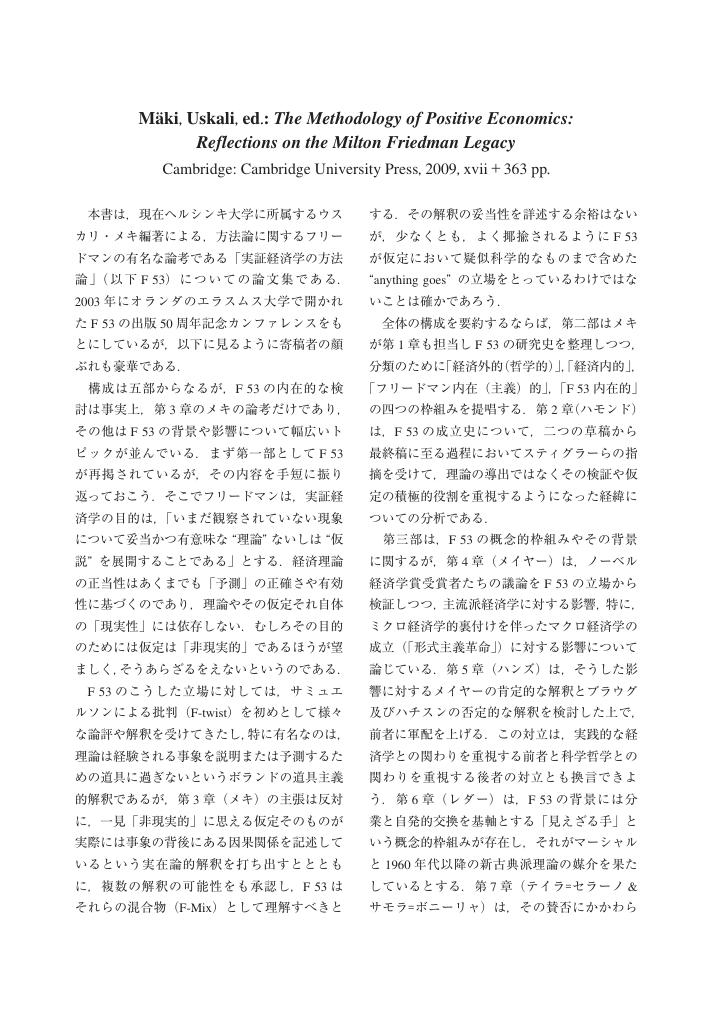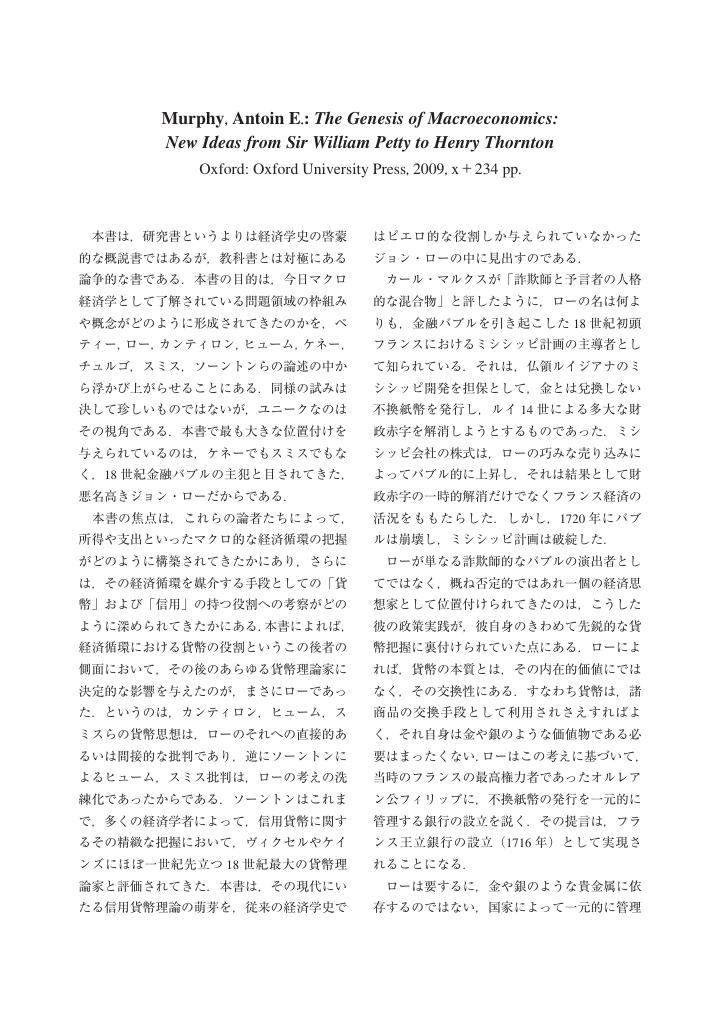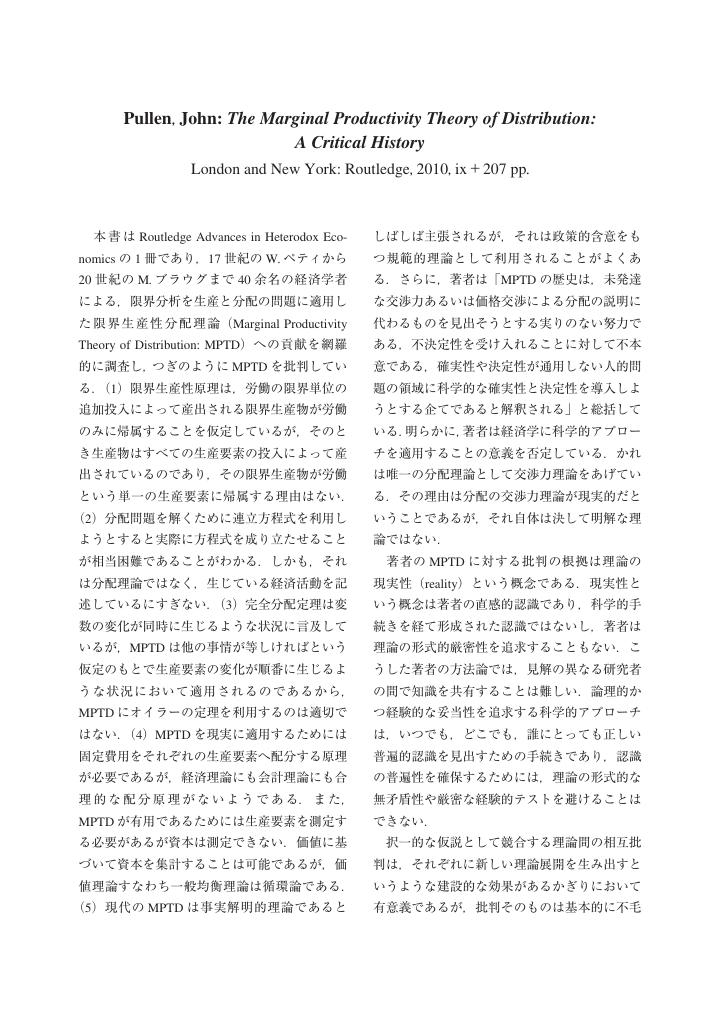- 著者
- 佐藤 方宣
- 出版者
- 経済学史学会
- 雑誌
- 経済学史研究 (ISSN:18803164)
- 巻号頁・発行日
- vol.54, no.1, pp.116-117, 2012 (Released:2019-10-31)
- 著者
- 壽里 竜
- 出版者
- 経済学史学会
- 雑誌
- 経済学史研究 (ISSN:18803164)
- 巻号頁・発行日
- vol.54, no.1, pp.118-119, 2012 (Released:2019-10-31)
- 著者
- 加藤 健
- 出版者
- 経済学史学会
- 雑誌
- 経済学史研究 (ISSN:18803164)
- 巻号頁・発行日
- vol.54, no.1, pp.120-121, 2012 (Released:2019-10-31)
- 著者
- 高見 典和
- 出版者
- 経済学史学会
- 雑誌
- 経済学史研究 (ISSN:18803164)
- 巻号頁・発行日
- vol.53, no.2, pp.130-132, 2012 (Released:2019-10-31)
- 参考文献数
- 2
1 0 0 0 OA 和田重司『資本主義観の経済思想史』中央大学出版部, 2010年, vii+338頁
- 著者
- 中澤 信彦
- 出版者
- 経済学史学会
- 雑誌
- 経済学史研究 (ISSN:18803164)
- 巻号頁・発行日
- vol.53, no.2, pp.133-134, 2012 (Released:2019-10-31)
1 0 0 0 OA J. E. ケアンズのアイルランド問題論 土地所有権問題を中心に
- 著者
- 刘 鑫
- 出版者
- 経済学史学会
- 雑誌
- 経済学史研究 (ISSN:18803164)
- 巻号頁・発行日
- vol.54, no.1, pp.61-82, 2012 (Released:2019-08-22)
This paper examines the classical economist John Elliot Cairnesʼs analysis of “the Irish prob-lem.” In particular, it focuses on the land proper-ty rights issue in Ireland. This study examines John Stuart Millʼs analysis of the Irish problem, although Mill was influenced by Cairnesʼs view on this issue. However, research on Cairnesʼs analysis of the Irish problem is extremely scarce. Therefore, this paper is significant in that it closely examines Cairnesʼs analysis. In this paper, the following two issues are discussed. First, Ireland faced several problems related to population, religion, and national inde-pendence. This paper deals with the reason that Cairnes paid the utmost attention to the land ownership problem. Secondly, by comparing Cairnesʼs view with that of Mill, can we clarify the characteristics of Cairnesʼs analysis? Cairnes emphasized the difference between land and other commodities, promoting the establishment of a system of land ownership appropriate to the Irish condition. Moreover, he criticized the lais-sez-faire policy: he advocated that it was neces-sary for the government to intervene in land ownership issues. Cairnesʼs criticism of the lais-sez-faire policy had an impact on Mill. This pa-per highlights Cairnesʼs view on the importance of institutions in solving economic problems. JEL classification numbers: B12, B31.
- 著者
- 若田部 昌澄
- 出版者
- 経済学史学会
- 雑誌
- 経済学史研究 (ISSN:18803164)
- 巻号頁・発行日
- vol.53, no.2, pp.112-113, 2012 (Released:2019-10-30)
- 参考文献数
- 2
- 著者
- 生垣 琴絵
- 出版者
- 経済学史学会
- 雑誌
- 経済学史研究 (ISSN:18803164)
- 巻号頁・発行日
- vol.53, no.2, pp.114-115, 2012 (Released:2019-10-30)
1 0 0 0 OA López, G. Julio and Michaël Assous: Michal Kalecki. Basingstoke: Palgrave Macmillan, 2010, x+258 pp.
- 著者
- 鍋島 直樹
- 出版者
- 経済学史学会
- 雑誌
- 経済学史研究 (ISSN:18803164)
- 巻号頁・発行日
- vol.53, no.2, pp.116-117, 2012 (Released:2019-10-30)
- 著者
- 太子堂 正称
- 出版者
- 経済学史学会
- 雑誌
- 経済学史研究 (ISSN:18803164)
- 巻号頁・発行日
- vol.53, no.2, pp.118-119, 2012 (Released:2019-10-30)
- 著者
- 篠原 久
- 出版者
- 経済学史学会
- 雑誌
- 経済学史研究 (ISSN:18803164)
- 巻号頁・発行日
- vol.53, no.2, pp.120-121, 2012 (Released:2019-10-30)
- 著者
- 平野 嘉孝
- 出版者
- 経済学史学会
- 雑誌
- 経済学史研究 (ISSN:18803164)
- 巻号頁・発行日
- vol.53, no.2, pp.122-123, 2012 (Released:2019-10-30)
- 著者
- 井上 義朗
- 出版者
- 経済学史学会
- 雑誌
- 経済学史研究 (ISSN:18803164)
- 巻号頁・発行日
- vol.53, no.2, pp.124-125, 2012 (Released:2019-10-30)
- 著者
- 齋藤 隆子
- 出版者
- 経済学史学会
- 雑誌
- 経済学史研究 (ISSN:18803164)
- 巻号頁・発行日
- vol.53, no.2, pp.126-127, 2012 (Released:2019-10-31)
1 0 0 0 OA 星野彰男『アダム・スミスの経済理論』関東学院大学出版会, 2010年, xi+217頁
- 著者
- 新村 聡
- 出版者
- 経済学史学会
- 雑誌
- 経済学史研究 (ISSN:18803164)
- 巻号頁・発行日
- vol.53, no.2, pp.128-129, 2012 (Released:2019-10-31)
1 0 0 0 OA アメリカにおける投機・賭博差異論の検討 1886-1922年
- 著者
- 越田 年彦
- 出版者
- 経済学史学会
- 雑誌
- 経済学史研究 (ISSN:18803164)
- 巻号頁・発行日
- vol.53, no.2, pp.59-75, 2012 (Released:2019-08-22)
This paper is intended to investigate the specula-tion theories discussed from the end of nine-teenth century to the early years of the twentieth century in the United States. During that period, business transactions such as futures trading, short selling, and settlements without any deliv-ery of properties were regarded as gambling or wagers, and therefore these transactions were prohibited by statutes in many states. However, some economists and finance professionals tried to justify these speculative transactions by argu-ing that there was a difference between specula-tion and gambling. In this paper, I investigate the arguments by H. C. Emery, A. T. Hadley, T. F. Woodlock, S. S. Pratt, H. Dewey, and J. E. Meeker, through which they all tried to distin-guish speculation from gambling and supported speculative transactions. This research is significant because of two points. First, the discussion about the difference between speculation and gambling in the United States at that time can be adapted to the present evaluation of speculation. Second, it is clear that speculation theories at that time had an impor-tant role in the birth of risk theory and insurance theory in the United States. JEL classification numbers: B 19, N 21.
1 0 0 0 OA 経済ナショナリズムと国家理性論についての再検討 『貿易の嫉妬』にみるリアリズムの意味
- 著者
- 伊藤 誠一郎
- 出版者
- 経済学史学会
- 雑誌
- 経済学史研究 (ISSN:18803164)
- 巻号頁・発行日
- vol.53, no.2, pp.76-99, 2012 (Released:2019-08-22)
In Jealousy of Trade (2005), I. Hontʼs “realism” involves both a warning against understanding The Wealth of Nations as a product of the two idealisms of “civic-humanism” and natural juris-prudence, and an attempt to apply “Machiavel-lism,” or the perspective of reason of state, to the history of the world trade economy. However, when one puts Hontʼs argument in the context of Machiavellian political discussion, such as that of F. Meinecke, R. Tuck, and W. F. Church, it becomes clear that all of these scholarsʼ realistic understanding of the European history of ideas entails the description of the idealʼs history, in terms of progress towards it, rather than its re-nunciation. Specifically, Meinecke finds his ide-al in reason of enlightenment, Tuck in peace, Church in morality, and Hont in “cosmopolitical economy.” Nevertheless, each views the ideal in terms of its tension with historical reality. In contrast, H. Takemoto and T. Nakano, unencum-bered by such European idealism, seek a realis-tic political economy if in different ways while disregarding the ideal. For these two thinkers, reality is not a temporal hindrance that will eventually be overcome, but rather what contin-uously and permanently is. Hence, T. Nakano argues that an ongoing governmental industrial policy is a necessary measure to protect the nation and society, and H. Takemoto finds in The Wealth of Nations something like a political economy of order and safety. JEL classification numbers: B 11, B 49, Y 30.
- 著者
- 松山 直樹
- 出版者
- 経済学史学会
- 雑誌
- 経済学史研究 (ISSN:18803164)
- 巻号頁・発行日
- vol.53, no.2, pp.110-111, 2012 (Released:2019-10-30)
- 著者
- 野口 旭
- 出版者
- 経済学史学会
- 雑誌
- 経済学史研究 (ISSN:18803164)
- 巻号頁・発行日
- vol.53, no.1, pp.125-126, 2011 (Released:2019-10-30)
- 著者
- 川俣 雅弘
- 出版者
- 経済学史学会
- 雑誌
- 経済学史研究 (ISSN:18803164)
- 巻号頁・発行日
- vol.53, no.1, pp.127-128, 2011 (Released:2019-10-30)
















